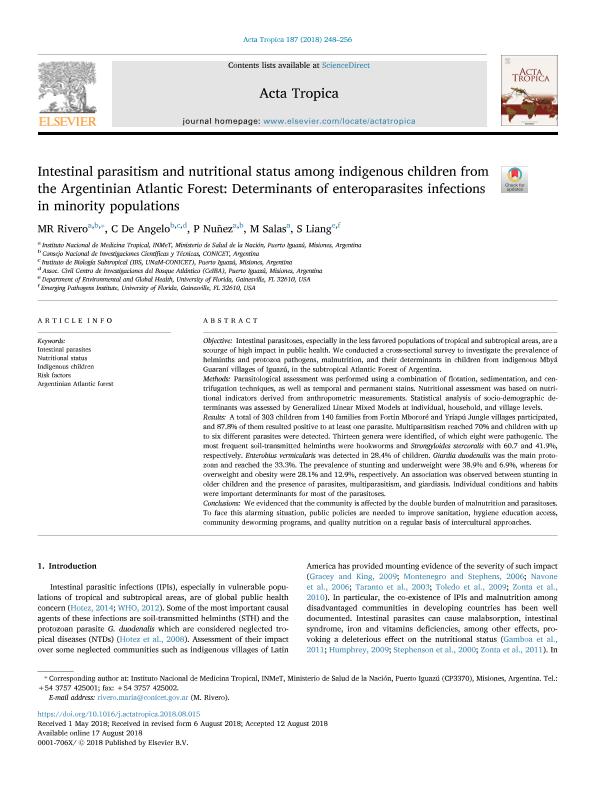Mostrar el registro sencillo del ítem
dc.contributor.author
Rivero, Maria Romina

dc.contributor.author
de Angelo, Carlos Daniel

dc.contributor.author
Nuñez, Pablo Alfredo

dc.contributor.author
Salas, M.
dc.contributor.author
Liang, S.
dc.date.available
2019-08-21T12:38:22Z
dc.date.issued
2018-11
dc.identifier.citation
Rivero, Maria Romina; de Angelo, Carlos Daniel; Nuñez, Pablo Alfredo; Salas, M.; Liang, S.; Intestinal parasitism and nutritional status among indigenous children from the Argentinian Atlantic Forest: Determinants of enteroparasites infections in minority populations; Elsevier Science; Acta Tropica; 187; 11-2018; 248-256
dc.identifier.issn
0001-706X
dc.identifier.uri
http://hdl.handle.net/11336/81901
dc.description.abstract
Objective: Intestinal parasitoses, especially in the less favored populations of tropical and subtropical areas, are a scourge of high impact in public health. We conducted a cross-sectional survey to investigate the prevalence of helminths and protozoa pathogens, malnutrition, and their determinants in children from indigenous Mbyá Guaraní villages of Iguazú in the subtropical Atlantic Forest of Argentina. Methods: Parasitological assessment was performed using a combination of flotation, sedimentation, and centrifugation techniques, as well as temporal and permanent stains. Nutritional assessment was based on nutritional indicators derived from anthropometric measurements. Statistical analysis of socio-demographic determinants was assessed by Generalized Linear Mixed Models at individual, household, and village levels. Results: A total of 303 children from 140 families from Fortin Mbororé and Yriapú Jungle villages participated, and 87.8% of them resulted positive to at least one parasite. Multiparasitism reached 70% and children with up to six different parasites were detected. Thirteen genera were identified, of which eight were pathogenic. The most frequent soil-transmitted helminths were hookworms and Strongyloides stercoralis with 60.7 and 41.9%, respectively. Enterobius vermicularis was detected in 28.4% of children. Giardia duodenalis was the main protozoan and reached the 33.3%. The prevalence of stunting and underweight were 38.9% and 6.9%, whereas for overweight and obesity were 28.1% and 12.9%, respectively. An association was observed between stunting in older children and the presence of parasites, multiparasitism, and giardiasis. Individual conditions and habits were important determinants for most of the parasitoses. Conclusions: We evidenced that the community is affected by the double burden of malnutrition and parasitoses. To face this alarming situation, public policies are needed to improve sanitation, hygiene education access, community deworming programs, and quality nutrition on a regular basis of intercultural approaches.
dc.format
application/pdf
dc.language.iso
eng
dc.publisher
Elsevier Science

dc.rights
info:eu-repo/semantics/openAccess
dc.rights.uri
https://creativecommons.org/licenses/by-nc-nd/2.5/ar/
dc.subject
Argentinian Atlantic Forest
dc.subject
Indigenous Children
dc.subject
Intestinal Parasites
dc.subject
Nutritional Status
dc.subject
Risk Factors
dc.subject.classification
Salud Pública y Medioambiental

dc.subject.classification
Ciencias de la Salud

dc.subject.classification
CIENCIAS MÉDICAS Y DE LA SALUD

dc.title
Intestinal parasitism and nutritional status among indigenous children from the Argentinian Atlantic Forest: Determinants of enteroparasites infections in minority populations
dc.type
info:eu-repo/semantics/article
dc.type
info:ar-repo/semantics/artículo
dc.type
info:eu-repo/semantics/publishedVersion
dc.date.updated
2019-08-20T14:15:54Z
dc.identifier.eissn
1873-6254
dc.journal.volume
187
dc.journal.pagination
248-256
dc.journal.pais
Países Bajos

dc.journal.ciudad
Amsterdam
dc.description.fil
Fil: Rivero, Maria Romina. Consejo Nacional de Investigaciones Científicas y Técnicas; Argentina. Ministerio de Salud de la Nación; Argentina
dc.description.fil
Fil: de Angelo, Carlos Daniel. Consejo Nacional de Investigaciones Científicas y Técnicas. Centro Científico Tecnológico Conicet - Nordeste. Instituto de Biología Subtropical. Instituto de Biología Subtropical - Nodo Puerto Iguazú | Universidad Nacional de Misiones. Instituto de Biología Subtropical. Instituto de Biología Subtropical - Nodo Puerto Iguazú; Argentina. Centro de Investigaciones del Bosque Atlántico; Argentina
dc.description.fil
Fil: Nuñez, Pablo Alfredo. Consejo Nacional de Investigaciones Científicas y Técnicas; Argentina. Ministerio de Salud de la Nación; Argentina
dc.description.fil
Fil: Salas, M.. Ministerio de Salud de la Nación; Argentina
dc.description.fil
Fil: Liang, S.. University of Florida; Estados Unidos
dc.journal.title
Acta Tropica

dc.relation.alternativeid
info:eu-repo/semantics/altIdentifier/url/https://www.sciencedirect.com/science/article/abs/pii/S0001706X18305436
dc.relation.alternativeid
info:eu-repo/semantics/altIdentifier/doi/http://dx.doi.org/10.1016/j.actatropica.2018.08.015
Archivos asociados
